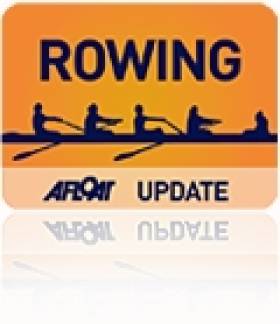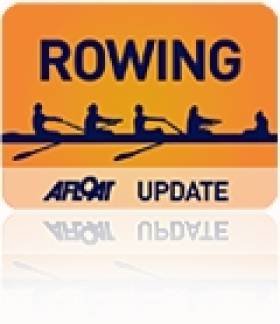Displaying items by tag: Lough Rinn
Irish Schools and University Championships Cancelled
#Rowing: Powerful winds and very choppy water forced the cancellation of the Irish Schools and University Championships at Lough Rinn today.
The early part of the programme went ahead, but after two hours of action, the conditions had deteriorated with no prospect of improvement. Boats were taking on water and some rowers had fallen in.
A decision on the Lough Rinn regatta tomorrow (Sunday) will be made later today. It is likely to go ahead, but may have some alterations to the schedule.
Colaiste Iognaid Edged Out by Methody at Irish Schools' Regatta
#Rowing: The agm of Rowing Ireland was businesslike and brief – coming in under an hour.
Neville Maxwell, the chair of the high performance committee, praised the “energy and enthusiasm” of high performance director Antonio Maurogiovanni. “He wants a system which is open and transparent,” he said.
Maxwell said that there was a move away from lightweight rowing and it was essential to build a programme which would last. Finding new sources of income was very important.
Leo Gibson replaced outgoing treasurer Dan Buckley, who has stepped down. The Old Collegians man spoke of the hope of drawing down Large Scale Sports Infrastructure grants.
Rowing Ireland president Eamonn Colclough said the priority was to finance work on the National Rowing Centre, with the hope of replacing the slips and, perhaps, the buoyed course. Next in priority would be Lough Rinn and then the proposed new Blessington course.
Colclough said that he hoped there was a big uptake on the package deal which will give Irish spectators a good way to travel to the World Rowing Championships in Linz in Austria in August/September. “I would love to hear The Fields of Athenry ring out over the waters in Linz,” he said.
Rowing Ireland is preparing to facilitate clubs using Lough Rinn by taking over the insurance requirements asked for by Leitrim County Council. The Council will “spend hundreds of thousands of euro” on developing the course and surrounds, Colclough told the agm.
The fixtures calendar for 2020 emerged in a very similar form to the one proposed. Erne Head moved to a week earlier than scheduled and will now take place on March 7th and the Castleconnell Sprint Regatta takes a similar step to May 9th. Carlow’s Dambuster Head is set to take place on February 1st.
Galway Regatta (June 6th) and Shandon Masters Regatta (August 15th) were late additions to the draft calendar put before delegates.
Awards
President’s: Seamus Scully, Carlow
Connacht: Paul Gallen
Leinster: Gerry Conway, Frank Moore, Willie Ryan, Mick Carney, Andrew Coleman
Munster: Brian Sheppard
Ulster: Jeremy Johnston
Impressive New Lough Rinn Course Opened
#ROWING: Minister of State Michael Ring yesterday opened the top-class new rowing and canoeing facility at Lough Rinn in Leitrim. The adjustable 2,000 metre course, which can be used for sprint canoeing and rowing, is of top intenational standard. According to Leitrim Tourism the investment so far has been €900,000. The next phase, if it is funded, would bring the associated facilities up to the standard where international events could be held at the course.
Deane Public Works of Enniskillen worked on the course with Polaritas of Hungary, whose systems were used in London 2012 and will be in Rio 2016.
Lough Rinn is very accessible from the North, South and East of Ireland. It has a number of major advantages, including dependable water levels, a 1,000 metre area at one end of the course where crews can warm up and cool down, and a north-south orientation, which should mean the course would rarely be adversely affected by windy conditions.
Lough Rinn Rowing and Canoeing Course Opens Today
#ROWING: The new Lough Rinn rowing and canoeing facility in County Leitrim will be officially opened tomorrow (Friday). The development is backed by Leitrim Tourism and Leitrim County Council. The opening will be attended by Michael Ring TD, Minister of State at the Department of Transport, Tourism and Sport with Special Responsibility for Tourism and Sport.
The facility has a 2,000 metre, eight-lane rowing course. It is within easy reach of Dublin, Belfast and Galway and has already attracted the attention of many of the clubs in Ireland, and in particular in Northern Ireland, where there is no facility of this nature.































































